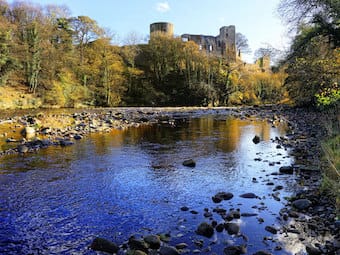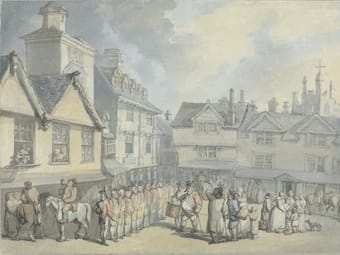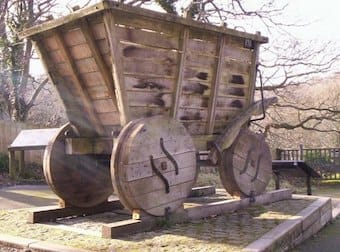631
In 1798, ‘Plays on the Passions’ appeared in London bookstores, but no one seemed to know who had written them.
In 1798, a volume of three dramas appeared in the English press, under the title of ‘Plays on the Passions.’ The passions were love and hatred, and the dramas were ‘Basil’, ‘The Trial’ and ‘De Monfort.’ They were warmly received but they were also anonymous, and the country’s literary men and women were beside themselves to know who had written them.
Picture: By James Whittle and James Laurie (1812), via Wikimedia Commons. Licence: Public domain.. Source.
Posted June 19 2020
632
Composer Samuel Coleridge-Taylor recalls his experiences as a judge in the distrustful world of music festivals and brass band contests.
‘Don’t you undertake that job at any price!’ was the advice given to composer Samuel Coleridge-Taylor when he was first offered the role of judge at an eisteddfod. But he went, and never regretted it. He fell in love with Wales, and was much in demand ever after for choir festivals and brass band competitions across England too. Even so, the work was not for the faint-hearted.
Picture: © Simon Speed, Wikimedia Commons. Licence: Public domain.. Source.
Posted June 18 2020
633
When the Rising of the North went all wrong in 1569, rebel leader Thomas Percy turned to trusted ally Hector of Harlaw for help.
In 1558, Mary I died and her half-sister Elizabeth, a Protestant, assumed the crown. Both the Pope and Philip II of Spain, Mary’s widower, were wrathful but no reaction came until September 1569. Mary Queen of Scots, a Catholic, had fled to cousin Elizabeth’s protection, and two Catholic nobles spotted an opportunity for change. George Carleton, Bishop of Chichester, takes up the tale of ‘the Rising of the North.’
Picture: © Andy Stevenson, Geograph. Licence: CC BY-SA 2.0.. Source.
Posted June 16 2020
634
The blacksmiths of Crowley’s ironworks in Winlaton and Swalwell took it upon themselves to regulate prices in the markets of Newcastle-upon-Tyne.
When at the end of Pride and Prejudice (1811) Jane Austen banished George Wickham to serve in a militia regiment in Newcastle-upon-Tyne, she was not sending him out of harm’s way. Lydia might enjoy the town’s musical salons and Theatre Royal, but all around was a hive of heavy industry and radical politics. Both had long been dominated by Crowley’s Crew, articulate freethinkers among the blacksmiths of Crowley’s ironworks at Winlaton.
Picture: By Thomas Rowlandson (1756-1827), via Wikimedia Commons. Licence: Public domain.. Source.
Posted June 14 2020
635
In 1770, agriculturist Arthur Young published his diary of a six-month tour of the north of England, which included a visit to the coalfields and ironworks of the Tyne.
In 1770, Arthur Young published his diary of a six months’ tour of the north of England. It included a visit to Newcastle, where he found a busy town prospering on the twin industries of the coal mine and the ironworks. Here, he gives his London readers a taste of the noisy, dirty but profitable business by the Tyne, and notes how the city’s fortunes rose and fell with the fortunes of war.
Picture: © Barry Wood, Geograph. Licence: CC BY-SA 2.0.. Source.
Posted June 13 2020
636
In 1807, the Government in Canada urged the leaders of the Five Nations to join with them in a medical revolution.
On November 8th, 1807, at Fort George in Upper Canada, leaders of Canada’s indigenous peoples were presented with an information pack explaining the newly developed science of vaccination, written by pioneering epidemiologist Edward Jenner. It was William Claus (1765-1826), Deputy Superintendent-General of Indian Affairs, who spoke for Jenner.
Picture: By Ernest Board (1877-1934), from the Library and Archives of Canada, via Wikimedia Commons. Licence: Public domain.. Source.
Posted May 27 2020





